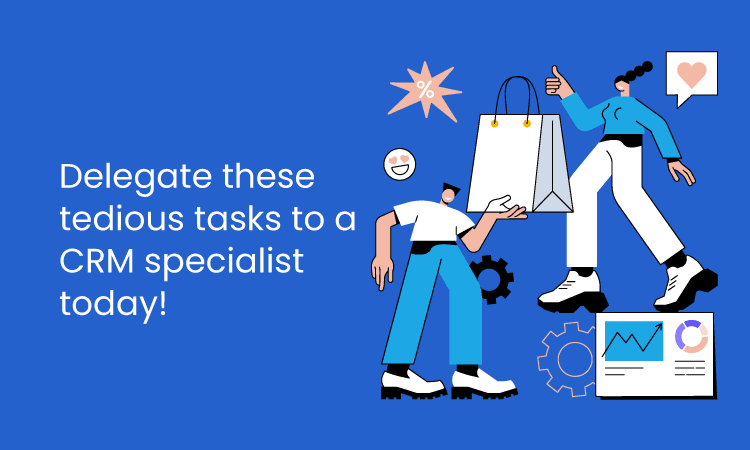Attracting and converting customers is one thing, but sustaining people’s interest is a whole other matter. To build customer connections and get people excited about your offerings, they need more than the initial glimmer of a nice deal or an interesting idea. They have to be sold on the product’s quality, your processes—everything behind the scenes. It is why customer relationship management strategies are essential to businesses.
But when you're a new entrepreneur, or you're just thinking of scaling up your small business, this can seem like an intimidating matter. What would you know about keeping buyers happy, when you're just starting out? Why must you think of this, anyway, when you're just trying to get more sales?
It's because sales and profits are directly affected by how well a company responds to its base's needs and wants. When you're unable to keep your buyers happy, how are you going to sell anything?
Customer Relationship Management: Strategy or Software?
What's more, when you’re growing online, you’ll encounter dozens of concepts that you’ll have to know to get up to speed. When it comes to CRM, for instance, people get confused whether it refers to the strategy, or to the tool used.
In a nutshell, it’s both–it is both the strategy and the tool. CRM describes the ways in which a business can improve overall customer satisfaction, and it also refers to the software companies use to keep track of their customers and clients.

What is a CRM strategy?
A customer relationship management (CRM) strategy is a plan for a business to grow its revenues through enhanced interactions between customers and the brand. This includes organizing and analyzing customer data, personalizing communication and interactions, and providing consistent, high-quality support.
Why your business needs customer relationship management strategies
Having a plan for customer relationship management is a sound business strategy. It helps you prioritize your customers and their preferences. A CRM strategy also lets you create more focused, valuable communication for customers interacting with your business.
When people feel like your company truly cares, it opens the doors for lasting links, repeat business, and customer loyalty. Prioritizing customer experience helps you stay organized and on top of any concerns or potential issues, while making customers feel listened to and valued.
Customer Relationship Management Strategies You Can Offload Today
While interacting with your market is necessary in customer retention, implementing strategies that work toward it does require some time and effort. Once you have your plan set up and your CRM systems going, though, it will make your team more productive and reduces the time it takes to increase customer satisfaction.
What will help you even more is delegating the more tedious parts of this strategy to an assistant specializing in customer relationship management. Read on for examples of how a Wing assistant helps you streamline the following customer relationship management strategies.

Running a complete audit
A CRM audit is a review of your customer relationship management practices and systems. This includes evaluating how well you gather, manage, and use customer information, as well as the effectiveness of your communication strategies and overall customer experience.
Conducting a CRM audit can help identify areas for improvement in your processes and ultimately lead to happier, more satisfied customers. It can also provide valuable insights for strategic planning and decision-making.
Outlining your sales process
An assistant can help you outline your sales process. Ask them to collate information on how your team converts leads into customers. These can be from phone calls, surveys, video recordings, notes from sales, etc.
Delegate the time-consuming aspects of this process like transcription, data entry, and documentation to your assistant. After you do, you'll be able to devote time to analyzing your systems and identifying how they can improve.
Defining your goals
After taking a deep dive into your sales process, it's time to formulate goals for it. Are you improving your CRM to increase sales or get a higher net promoter score? Would you like to focus on newly-acquired customers, ones who have been with you a while, or ones with a high lifetime value?
When you have an assistant, it's easier to prioritize things like this. Often, business owners spend hours checking off admin tasks on their to-do lists, which means high-level strategizing such as what is needed here gets set aside.
Identifying Your Customers
Businesses must be able to identify their customers to effectively provide personalized experiences and targeted marketing. This means gathering information such as names, addresses, purchasing behavior, preferences, and demographics.
The process of identifying customers entails plenty of effort. Nevertheless, it plays a significant role in successful customer relationship management. Here are the things you could delegate when finding your ideal customer.
Pinpointing your customer journey
The customer journey is the customer's path from initial awareness of your company all the way to purchase and post-purchase behavior. Knowing the customer's path lets you better understand their needs and wants, which means improving your image overall.
One way to identify the customer journey is by creating personas for your audience. These personas can outline demographic information, potential pain points, and how they may interact with your business.
How can a CRM assistant help in determining the customer journey?
You can make this process much faster by letting your assistant handle the data gathering portion of mapping the journey. For you to create personas that make sense, it'll have to come from a logical source. You cannot arbitrarily decide what demographics to focus on, what their pain points are, and how they might interact with your brand.
Instead, ask your assistant to go over sales data and compile information on your top clients or most frequent buyers. Identifying trends in customer types lets you figure out their potential touchpoints with your brand. such as social media, your website, in-person interactions, and more.
Then, take it a step further by brainstorming the thoughts and emotions a customer may have at each touchpoint, and what actions they may take. If you have recordings of sales calls, you can use that to mine potential objections, which will enrich your marketing even further. When you have an assistant, it is easier to get all your customer data in one place.
Understanding your competitors and your positioning
Besides getting to know your customers, managing relationships involves understanding your competitors. When you build a business, you will not operate in a vacuum. Most companies will have competitors, and a smart business owner will know how to capitalize on their rivals.
An assistant can conduct secondary research on your behalf. They can look at your competitors' websites and record aspects of it that you ought to be aware of as you build your online brand.
Some assistants who have experience in search engine optimization can also compile data on your competitors' websites. Knowing what keywords your rivals are ranking for will allow you to aim for the same words and phrases with better-written content. You can also incorporate these words in your interactions with buyers or clients.
In a similar vein, you could ask your assistant to find content gaps, keywords related to the ones your competitors rank for, but that they aren't using in their articles or pages. If you can produce content that uses these keywords first, you could get ahead of them in the search results pages for those phrases in particular.
Using automation to your advantage
With the right software, you can automate customer relationship management, streamline your processes, and improve efficiency. Consider using a system that integrates with other programs, such as project management platforms. Automation features like lead scoring and automatic data entry can also make a huge difference in keeping your CRM organized.
Don't forget to regularly review and update your processes to make the most out of your chosen solutions. By implementing these strategies, you'll be able to focus on building relationships with your customers rather than getting bogged down by tedious administrative tasks.
If I'm automating tasks, why do I still need a CRM assistant?
CRM software boosts productivity by up to 29%, and using it is a no-brainer for companies that want rapid growth. If you've invested resources into creating a software or system, though, you might wonder why it'll be beneficial for you to get an assistant to manage your CRM.
There are several reasons for this. First, assistants who specialize in customer success know how to use software for CRM. So, they won't have as much of a learning curve as you would if you were to implement things yourself.
Second, having an assistant use your CRM ensures that you don't have to take care of entering data and updating it in your software, which is one of the biggest time sinks for business leaders and executives. Here are some of the things your assistant can do on your behalf:
Auditing your customer database regularly
Besides data input and updating entries, you can ask your assistant to perform regular database audits. Using a set of criteria you determine, let your assistant check the entries and either retain, update, or delete information.
When you leave this to your assistant, you can focus on analyzing how you have set up your automations. You will also have time to evaluate how your team is managing customers. These are things owners typically don't get around to doing because they're too caught up with data entry and cleaning.
Publishing content that adds value and drives conversion
You can also have your CRM assistant be in charge of other aspects of customer success, such as content marketing. Some parts of creating and publishing content takes a lot of time, such as scheduling posts, scraping websites for keywords, and creating graphics and images.
When you hire a specialist, you can focus on writing the message or coming up with the concept for your marketing collateral, and offload the other tedious yet necessary things.
Creating more personalized communications
As your assistant gets more and more familiar with your business, they'll start to be more knowledgeable in your business' best practices. Really good assistants will be able to create personalized messages to use when interacting with your customers.
Something as simple as including people's first names in messages will go a long way in making your customers feel like you know them and are willing to understand where they are coming from.
Using innovative customer relationship management
Last but not least, your assistant can help you create new and interesting ways to leverage relationships in building your business. Innovation is one of the values driving customer success – businesses need to keep looking for new ways to serve their audience and attend to their needs.
With an assistant, you'll open yourself up to even more opportunities to create meaningful connections with your customers. Here are some ways you can be innovative when delivering customer service.
Delivering customer engagement live
Having an assistant means you can launch webinars and workshops and focus on the discussions, instead of worrying about the administrative aspects of hosting an online event. Let your assistant set up the live stream, monitor responses, moderate attendees, and ensure your audience can access visual aids you're using like videos and slide shows.
Maintaining an omni channel presence
When you have an assistant, it's easier to maintain multiple channels through which customers can reach out to you. Besides maintaining a helpline for concerns, you can have channels for text messaging, email marketing, chat, and more.
Having several channels for customers to reach you means you can give more access to a larger group of customers. People who primarily use email to communicate are different from those who will text, and from those who will call, and so on.
If you have several assistants, you can even ensure that your business has 24/7 coverage by having your specialists take shifting schedules in monitoring your channels. Having round-the-clock coverage improves customer perception of your company.
Automating customer support
Automate customer support when you can by implementing self-service solutions, using chatbots, and having a ticketing system. The best solution is to use these automations to complement human trained assistants who will respond to customer concerns.
While automations are cost-efficient, they lack a human touch. Having a robotic voice read out recorded answers just doesn't seem as personal as having a person listening to your concerns. Canned responses are also limited and unable to solve complex or nuanced issues.
Using social media for customer service
Develop a strong image by using social media for customer service. The internet amplifies everything about a company, and if you show that you genuinely care for your customers, it'll show. Respond to customer concerns posted on your official social media pages.
You could offload managing this channel to a specialist. Although responding to each and every comment or review on your pages can be tedious, it'll be bad for your company if people ask you something online and all they get is radio silence.
Increasing Customer Satisfaction
Your service representatives are often the first human point of contact many customers have with your company. So, they must serve as ambassadors just as much as they are technicians or problem solvers.
Relationship management starts and ends with putting your audience first. This can be overwhelming, especially if you're doing everything yourself. However, knowing what to delegate will help you create a system that works for you while ensuring that you keep your processes efficient.
Hire a Wing Assistant and create the best CRM system for your team
Managing how your target market sees you can be challenging, to say the least. You have to make sure you're addressing all the issues they have with your products or services, and that you're doing it in a timely and relevant manner. You'll be more effective in ensuring that you meet buyers' needs if you offload some crucial yet time-consuming tasks to an assistant.
Offload to a Wing Assistant today! We are the world's best assistant for business, connecting entrepreneurs and executives with trained, dedicated global talent. Book a call today to learn what we can do for you!
Aya is Wing Assistant’s blog manager. When she’s not wrangling content briefs, editing article drafts and handling on-page SEO, she is crafting messages for Wing’s other communication materials. Aya writes about SaaS startups, marketing for startups, search engine optimization, and pop culture.







